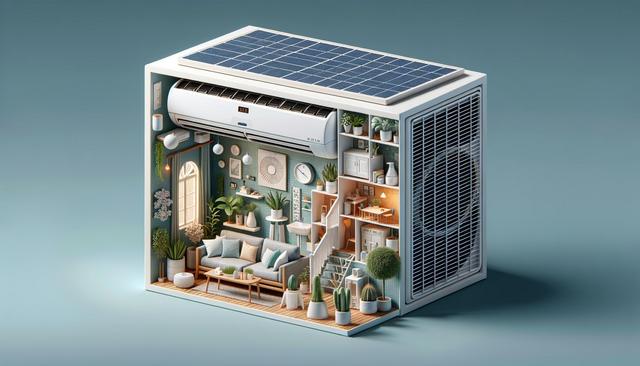Understanding Solar Air Conditioning
Solar air conditioners operate by using solar energy—typically harnessed through photovoltaic (PV) panels—to power cooling systems. Unlike traditional air conditioning units that rely entirely on electricity from the grid, solar AC units reduce dependence on nonrenewable energy sources. This makes them a compelling option for homeowners and businesses aiming to lower their carbon footprint and long-term energy costs. There are two main types of solar air conditioners: hybrid solar-powered systems and fully solar-powered systems. Hybrid models can switch between solar energy and grid electricity, providing flexibility, while fully solar-powered systems operate independently of the grid.
The technology behind these systems has advanced significantly, making them more efficient and accessible. Many units now come with built-in battery storage or compatibility with external batteries, allowing them to store excess solar energy for use at night or during cloudy weather. This innovation enhances their reliability and makes them suitable for various climates and usage patterns.
Affordability Without Compromising Efficiency
One of the common concerns about solar air conditioners is their upfront cost. However, as solar technology becomes more widespread and manufacturing costs decrease, more affordable models have entered the market. These units offer a balance between cost and performance, making them attainable for a wider range of consumers. Many governments and local municipalities also offer incentives, rebates, or tax credits for installing solar-powered systems, further reducing the financial burden.
Key features that make solar AC units cost-effective include:
- Low operating costs due to reduced electricity usage
- Decreased maintenance needs compared to traditional HVAC systems
- Longer lifespan of components
- Potential resale value increase for solar-equipped properties
By evaluating energy savings over time, many users find that the total cost of ownership for a solar air conditioner is significantly lower than that of conventional systems, particularly in regions with high electricity rates.
Installation and Compatibility Considerations
Installing a solar air conditioner differs slightly from conventional units, primarily because of the need for solar panel integration. It’s crucial to assess whether your property receives sufficient sunlight throughout the day, as this directly impacts the system’s efficiency. Roof orientation, shading from trees or nearby buildings, and regional climate patterns all influence performance.
Before installation, it’s recommended to perform an energy audit to determine your cooling needs and whether your current electrical setup can support a solar system. Some homes may require minor electrical upgrades or roof reinforcements to accommodate the added equipment. It’s also important to consider the available space for solar panels—larger systems may need more surface area to operate at full capacity.
In many cases, solar air conditioners can be integrated with existing HVAC infrastructure, making the transition smoother. Working with certified solar installers ensures that your system is optimized for efficiency, meets local building codes, and qualifies for any available incentives.
Choosing the Right System for Your Needs
With a growing number of solar air conditioning models on the market, choosing the right one depends on several factors, including your climate, budget, and energy goals. Consider the following when evaluating options:
- Cooling capacity (measured in BTUs or tons)
- System type (hybrid vs. fully solar)
- Battery storage capability
- Energy efficiency rating (such as SEER)
- Warranty and support services
It’s also helpful to read user reviews and consult with professionals who can guide you through product comparisons and performance expectations. While an initial investment is necessary, choosing a unit with a strong efficiency rating and proven durability can maximize your return over time.
For those in areas with hot climates and high electricity bills, investing in a solar air conditioner can lead to noticeable energy savings. Additionally, combining your solar AC with other energy-saving practices—like using ceiling fans or improving insulation—can further reduce overall cooling costs.
Environmental and Long-Term Benefits
Beyond the financial savings, solar air conditioners offer clear environmental advantages. By reducing electricity consumption from fossil-fuel-based power plants, users contribute to lower greenhouse gas emissions and a more sustainable energy grid. This is particularly important as climate change drives the need for energy-efficient technologies.
Long-term benefits include:
- Decreased reliance on nonrenewable energy sources
- Improved energy independence, especially in remote or off-grid areas
- Positive impact on property value and marketability
- Support for broader clean energy initiatives
As solar technology continues to evolve, it’s likely that solar air conditioners will become even more efficient and accessible. By adopting these systems now, users not only save on energy costs but also play a proactive role in shaping a more sustainable future.
Conclusion: Embrace Cost-Effective Cooling Solutions
Affordable solar air conditioners represent a meaningful step toward energy-efficient and environmentally responsible living. While the initial setup may require some planning and investment, the long-term benefits in cost savings, reliability, and sustainability make them a practical option for many households and businesses. By understanding how these systems work, evaluating your specific needs, and exploring available incentives, you can make an informed decision that aligns with both your budget and environmental values.






